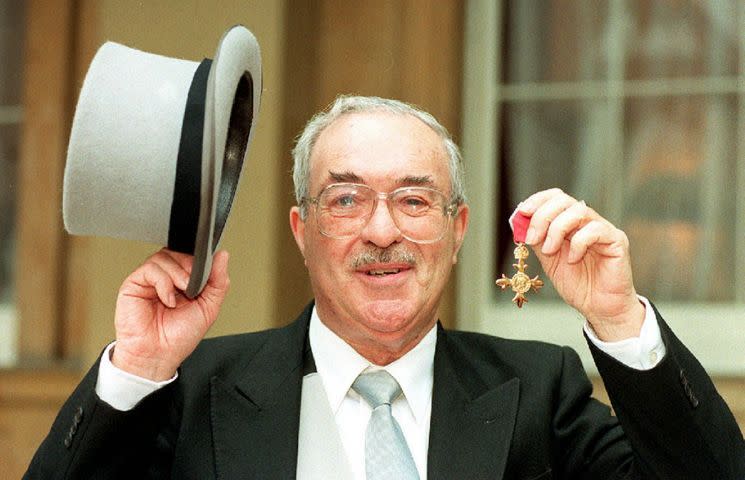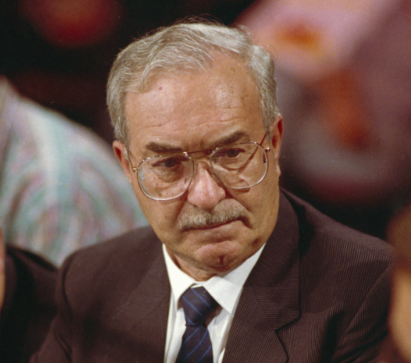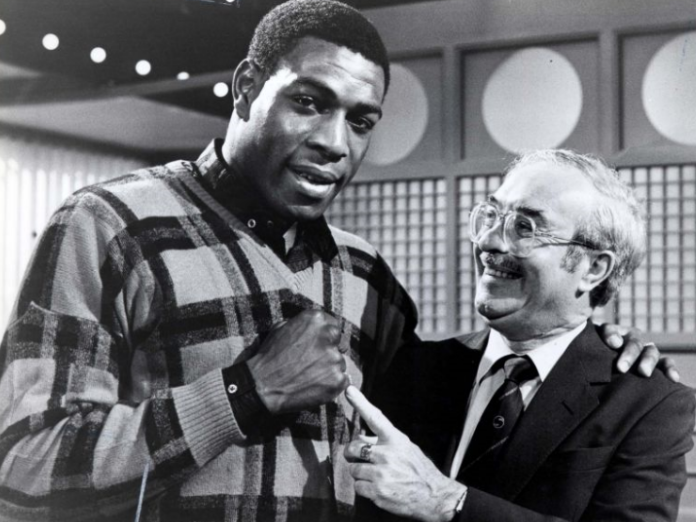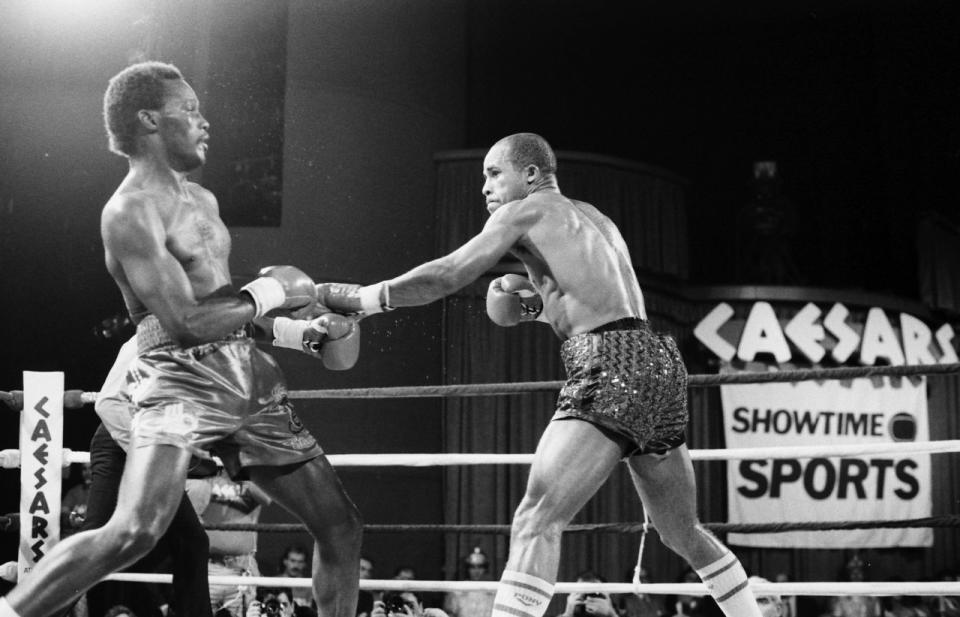yahoonick
In our weekly series, Yahoo Sport’s Nick Metcalfe features a famous voice of sport. This week, the great ITV boxing commentator Reg Gutteridge goes under the spotlight.

Reg Gutteridge will be long remembered as a great authority on boxing and one of the most famous voices to ever be associated with ITV.
For decades, boxing fans knew where they were with big fights. It was either Harry Carpenter on the BBC, or Gutteridge on ITV. And didn’t we just love it?
Gutteridge was always going to be a boxing man. His grandfather Arthur was a boxer. His father and uncle, Dick and Jack - known throughout the sport as the ‘Gutteridge Twins’ - were the premier cornermen and trainers in Britain throughout the 1920s and 1930s.
A young Reg was himself an amateur flyweight boxer. But his life changed for ever during World War Two, when he was a soldier with the King’s Royal Rifle Corps. On D-Day, in 1944, Gutteridge jumped from his tank and landed on a mine. He lost his left leg in the accident, and his hopes of a boxing career were over. He was only 20.
Gutteridge was determined to be ringside for the rest of his days however. He had worked for the London Evening News as a junior and copy boy before the war, and after it finished he rejoined the newspaper as a boxing reporter.
Gutteridge continued in that role for 30 years. He was a very fine writer, and because of his background in the sport, he was quickly able to win the respect of top fighters.
But it’s behind the microphone that millions of fans will best remember him. He started calling big fights for ITV in 1962, and he soon became ever present. The great champions came and went. The likes of Muhammad Ali, Sonny Liston, Sugar Ray Robinson, Roberto Duran, “Marvelous” Marvin Hagler, Thomas “Hitman” Hearns.
Iconic names. And Gutteridge was there to see them all, and so many more greats besides. A permanent witness if ever there was one.

Us sports fans are by and large all the same. We know what we want with our presenters and commentators. We like knowledge and gravitas. Gutteridge had both of them in abundance, from beginning to end. We knew he knew what he was talking about, and we were glad he was happy to share his wisdom.
And of course, there was another crucial aspect, which is shared by nearly all the broadcasters in this series. Gutteridge simply had a great love and affection for his sport. He cared deeply for it. That shone through loud and clear. In a way, you felt commentating on boxing for Gutteridge wasn’t only a job, but almost a vocation.
Stories abound of Gutteridge’s decency, and his good humour. Even his artificial leg wasn’t off limits. On one occasion in the south of France, he took off his replacement limb, hobbled along a beach to the water’s edge, and promptly removed his dressing gown, shouting “sharks” to holidaymakers. Pandemonium ensued, as you might imagine.
The most dominant figure during the Gutteridge years at ringside was the incomparable Ali, who occupies a very special place in the history of sport. From the moment he won Olympic gold in Rome at the 1960 Games - in those days Ali was known as Cassius Clay - it was obvious we were seeing a box office superstar for the ages.
His excellence in the ring was there for all to see. Many of his victories became legendary, like his “Rumble in the Jungle” win against George Foreman in 1974. Carpenter commentated on that fight in Zaire, with the BBC having highlights rights, but many had first heard Gutteridge describe it, via live screenings in cinemas around the country.
Not only was Ali fearsome and fabulous in the ring, but he was a truly compelling and controversial character out of it. Gutteridge became good friends with him. The celebrated boxing journalist for The Sun, Colin Hart, once commented: “Ali knew everybody by sight, but he didn’t know anybody’s name, expect for two men in this country. One was Harry Carpenter from the BBC, the other one was Reg Gutteridge of ITV.”
Such was their close relationship that Ali once allowed the ITV man into his corner to interview him during a 1973 fight against Dutchman Rudi Lubbers. “Can you say something to World of Sport, Muhammad?”, Gutteridge enquired. Ali was happy to oblige: “I’m glad my fans in London can see me in my last days - I’m getting old now.”
On another occasion, Gutteridge supposedly joked with Ali: “You think you’re a tough guy, don’t you? Well, I’ll show you what tough is,” before stabbing himself in his false leg with a steak knife. Ali, for once, was stunned into total silence.
In the 1980s, when Gutteridge fell very ill with blood poisoning, Ali turned up unannounced to his bedside at a west London hospital. Gutteridge was so overwhelmed, he burst into tears.
He would be the first to say the fighters were always the rightful centre of attention, but Gutteridge was so often part of the whole boxing package on television. In 1980, when Britain’s Alan Minter beat the Italian Vito Antuofermo in Las Vegas to become world middleweight champion, Gutteridge clambered into the ring for an interview.
"Can you imagine all your fans watching this back home?” he asked the British boxer. “No, they’ll all be p***** by now,” joked Minter, live on air.

The 1985 clash between Hagler and Hearns at Caesars Palace was an astonishingly brutal one, that instantly went down in folklore. Gutteridge produced a fittingly superb commentary.
He really did live and breath that contest, telling viewers early on: “This is unloading a lot of carefully nurtured hate, isn’t it?” and as the fight ended, he seemed genuinely shocked when he described it as “three rounds of absolute mayhem".
My personal favourite Gutteridge memory is probably from the autumn of 1986, and a wonderfully unexpected victory for Britain’s welterweight Lloyd Honeyghan against the great Don Curry in Atlantic City.
Curry, who had won all his previous 25 fights, was a strong favourite, but an inspired Honeyghan was too good for him, the contest stopped after the sixth round. It was a genuinely memorable occasion, and a large audience tuned in for ITV highlights on the Sunday afternoon following the fight. Gutteridge was clearly delighted to be describing a great British boxing success story in America. And because of his sheer experience, he was able to make this grand call:
“That is one of the biggest turn-ups, I’m going to say it, in the history of boxing.”

Gutteridge worked on other sports for ITV too. The Saturday afternoon programme World of Sport, which ran from 1965 to 1985, was an eclectic affair. As well as regularly showing boxing and more mainstream sports, there were less well known pursuits like greyhound racing and tug of war, which were also described by Gutteridge. Besides all that, he worked on the biggest event in sport, the Olympic Games, on six occasions.
But he was of course first and foremost a boxing man, through and through. For many years in the second half of his broadcasting career, Gutteridge formed a very fine partnership with former world lightweight champion Jim Watt. They complemented each other perfectly. Watt later joked: “It was as if he adopted me. Every trip we’d go on, he’d say ‘have you got your passport? Let me see it’.”
In the 1990s, boxing on ITV was a very significant deal indeed. Big fights on a Saturday night saw that famous duo of Gutteridge and Watt in their element. Audiences of up to 16 million tuned in for some classic bouts, including two middleweight clashes between Nigel Benn and Chris Eubank, and a brutal super middleweight fight between Benn and Gerald McClellan that resulted in the American being in a coma for two weeks and permanently disabled.
Later there was the emergence of the charismatic “Prince” Naseem Hamed. Once, when the Sheffield man somersaulted his way into the ring in theatrical style, Gutteridge joked: “The ego has landed.”
Gutteridge later did some work for Sky, as the satellite company began to pick up more rights for big fights, as well as the new Talk Radio. But by then he was in the autumn of his years. Such was his standing within the sport that he was inducted into the International Boxing Hall of Fame in 2002.
Gutteridge died after suffering a stroke in 2009, at the age of 84. The boxing world paid fulsome tribute. Former world featherweight champion Barry McGuigan said: “Everybody wanted to meet him, everybody wanted to be talked about by him… he wasn’t just a great commentator, he was a great human being.“
We’ve been so lucky as sports fans to enjoy listening to some truly wonderful voices over the years. Gutteridge was one of the special ones. A terrific commentator for generations, he really was a great friend of the fight game. He’ll be fondly remembered, and rightly so, by millions of viewers.


